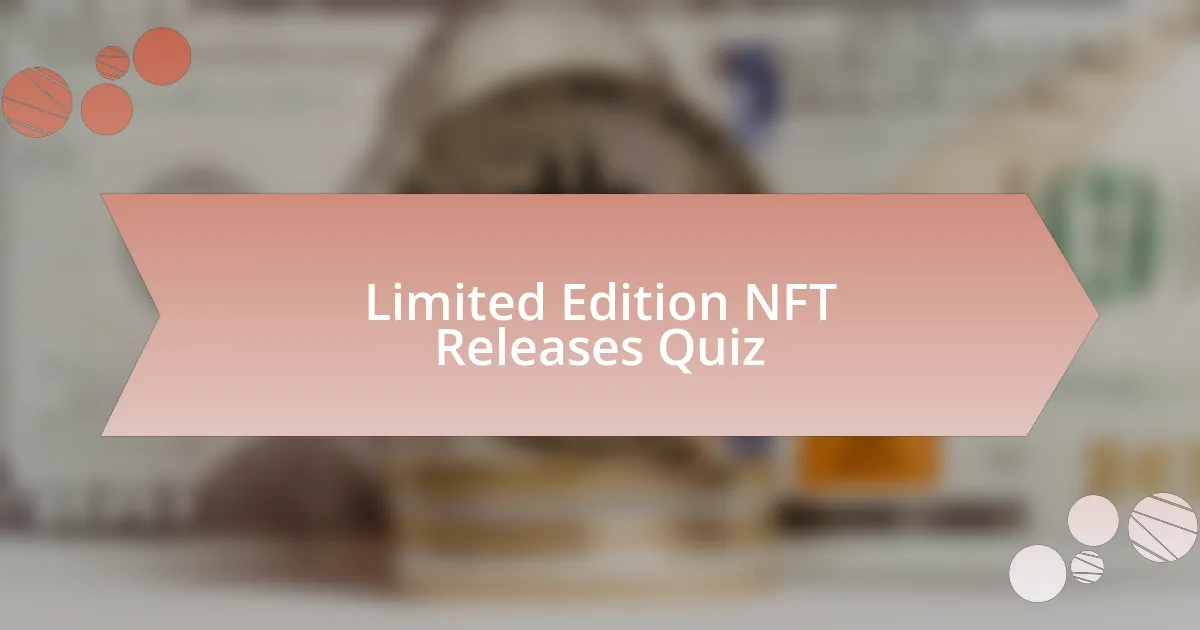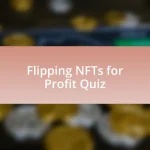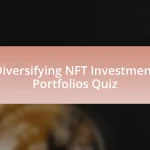
Start of Limited Edition NFT Releases Quiz
1. What distinguishes a Limited Edition NFT from a regular NFT?
- A Limited Edition NFT is more expensive because it offers more features.
- A Limited Edition NFT has a fixed supply, ensuring exclusivity.
- A Limited Edition NFT is always associated with a physical item.
- A Limited Edition NFT can be duplicated indefinitely, unlike regular NFTs.
2. In what ways do Limited Edition NFTs foster customer engagement?
- Limited Edition NFTs guarantee automatic refunds for unsatisfied customers in all cases.
- Limited Edition NFTs provide access to generic products, promoting wider market appeal.
- Limited Edition NFTs increase mass production of items, making them more accessible to all.
- Limited Edition NFTs create a sense of urgency and exclusivity, driving stronger customer engagement.
3. How is the blockchain pivotal in maintaining the rarity of Limited Edition NFTs?
- Blockchain prevents the transfer of ownership of Limited Edition NFTs.
- Blockchain technology ensures scarcity and uniqueness of Limited Edition NFTs.
- Blockchain allows for unlimited replication of Limited Edition NFTs.
- Blockchain keeps NFTs anonymous and non-traceable for collectors.
4. Which notable artist launched a successful Limited Edition NFT series?
- Picasso
- Tiffany & Co.
- Van Gogh
- Banksy
5. How do Limited Edition NFTs enhance the value proposition for consumers?
- Limited Edition NFTs are mass-produced, leading to increased accessibility for all consumers.
- Limited Edition NFTs eliminate the need for physical products, reducing consumer interest.
- Limited Edition NFTs create scarcity, enhancing consumer value and exclusivity.
- Limited Edition NFTs reduce competition, making them less valuable in the market.
6. What role do secondary markets play in the lifecycle of Limited Edition NFTs?
- They create a universal pricing structure for all NFTs.
- They eliminate the need for original creators.
- They increase liquidity and allow for price discovery.
- They prevent any form of resale activity.
7. How can brands leverage Limited Edition NFTs to diversify revenue streams?
- Brands can use Limited Edition NFTs to replace all physical products.
- Brands can focus solely on mass-producing Limited Edition NFTs for profits.
- Brands can create exclusive membership experiences tied to Limited Edition NFTs.
- Brands can discount their existing products through Limited Edition NFTs.
8. What factors contribute to the appreciation of Limited Edition NFTs in value?
- Unregulated market trends
- High transaction fees
- Digital art file size
- Exclusivity and scarcity of the NFT
9. What challenges do creators face when releasing Limited Edition NFTs?
- High production costs for digital artwork
- Limited marketing opportunities for traditional models
- Complexity in integrating physical items
- Difficulty in establishing trust with buyers
10. How do social media platforms impact the success of Limited Edition NFT launches?
- Social media platforms create buzz and engagement for Limited Edition NFT launches.
- Social media platforms have no effect on Limited Edition NFT launches.
- Social media platforms reduce interest in Limited Edition NFT launches.
- Social media platforms limit the audience for Limited Edition NFT launches.
11. What is the importance of community building in Limited Edition NFT projects?
- Community building makes NFT transactions more expensive for buyers.
- Community building has no impact on the success of NFT projects.
- Community building enhances engagement and loyalty among NFT holders.
- Community building reduces the value of NFTs for collectors.
12. How do attributes like artwork and utility influence the desirability of Limited Edition NFTs?
- Artwork and utility enhance the desirability of Limited Edition NFTs by providing unique experiences and value.
- Low quality visuals and lack of utility reduce the appeal of Limited Edition NFTs to consumers.
- Limited Edition NFTs are desirable only because they are priced high without any added benefits.
- The rarity of Limited Edition NFTs matters less than the marketing strategy used to promote them.
13. In what ways can Limited Edition NFTs be integrated with physical merchandise?
- Limited Edition NFTs are only digital artworks with no connection to physical goods.
- Limited Edition NFTs automatically convert physical items into digital currencies.
- Limited Edition NFTs can be tied to physical merchandise as proof of authenticity and ownership.
- Limited Edition NFTs act as discounts for physical merchandise only.
14. How does the concept of digital scarcity apply to Limited Edition NFTs?
- A Limited Edition NFT is a digital asset that can be endlessly duplicated.
- A Limited Edition NFT is a common digital asset with no uniqueness.
- A Limited Edition NFT is a unique digital asset with a fixed supply, ensuring exclusivity and scarcity.
- A Limited Edition NFT is a free digital asset with unlimited supply.
15. What technological advancements have facilitated the creation of Limited Edition NFTs?
- 3D printing technology
- Virtual reality systems
- Blockchain technology
- Augmented reality apps
16. How do NFTs support adherence to intellectual property rights in collectibles?
- NFTs authenticate ownership and track rights through blockchain technology.
- NFTs enforce IP rights by limiting the number of copies produced.
- NFTs replicate physical items to ensure copyright control.
- NFTs are solely for art collection without any legal implications.
17. What are common misconceptions about Limited Edition NFTs in the investment community?
- Limited Edition NFTs have no intrinsic value and cannot be sold.
- Limited Edition NFTs can be copied easily and are not unique.
- Limited Edition NFTs are guaranteed to increase in value over time.
- Limited Edition NFTs are identical to all other NFTs available.
18. How do Limited Edition NFTs differ in their launch strategies compared to traditional collectibles?
- Limited Edition NFTs use a random drop strategy to create excitement among collectors.
- Limited Edition NFTs are launched only when demand fluctuates in the market.
- Limited Edition NFTs launch with pre-sale campaigns to build anticipation and exclusivity.
- Limited Edition NFTs are released in bulk to maximize initial sales without pre-planning.
19. What are the environmental considerations associated with Limited Edition NFT releases?
- Limited Edition NFTs are a renewable energy source for digital transactions.
- Limited Edition NFTs have no impact on the environment at all.
- Limited Edition NFTs have a high carbon footprint due to the energy-intensive blockchain technology used.
- Limited Edition NFTs improve air quality through digital tokenization.
20. How can collaborations between brands enhance Limited Edition NFT offerings?
- Collaborations reduce the cost of creating NFTs for brands.
- Collaborations increase the number of NFTs available for purchase.
- Collaborations can lead to unique designs that attract customers.
- Collaborations only benefit the brands with the larger following.
21. What future trends are anticipated for Limited Edition NFTs in the upcoming years?
- The future of NFTs will solely focus on increasing the supply of digital collectibles.
- The future of NFTs in e-commerce will focus on offering unique products and creating exclusive communities.
- The future of NFTs will lead to the complete abandonment of physical goods in retail.
- The future of NFTs will see them being primarily used for virtual currency exchanges.
22. How do rewards systems within NFT ecosystems benefit holders of Limited Edition NFTs?
- Holders automatically receive refunds on purchases.
- Holders can exchange their NFTs for cryptocurrencies.
- Holders are given free merchandise from brands.
- Holders gain access to exclusive events and perks.
23. In which ways do Limited Edition NFTs challenge traditional notions of ownership?
- Limited Edition NFTs are only digital currencies without any ownership implications.
- Limited Edition NFTs primarily serve as a method for creating digital copies of items.
- Limited Edition NFTs enforce traditional ownership by making items easily transferable.
- Limited Edition NFTs redefine ownership by allowing unique digital representation and access to exclusive benefits.
24. How does storytelling play a role in marketing Limited Edition NFTs?
- It creates a narrative that enhances perceived value and connection.
- It focuses on the technology behind blockchain without engaging consumers.
- It relies solely on social media trends without a clear story.
- It limits audience reach by being too specific about the product.
25. What impact do celebrity endorsements have on the sales of Limited Edition NFTs?
- Celebrity endorsements have no effect on Limited Edition NFT sales, as consumers do not respond to them.
- Celebrity endorsements typically harm sales of Limited Edition NFTs by causing mistrust among potential buyers.
- Celebrity endorsements actually reduce interest in Limited Edition NFTs, leading to lower sales figures.
- Celebrity endorsements can significantly boost sales of Limited Edition NFTs by leveraging their influence and reach.
26. What are the legal implications of Limited Edition NFT ownership?
- Limited Edition NFTs have no legal implications concerning copyright.
- Limited Edition NFTs cannot be sold and are perishable like food products.
- Limited Edition NFTs may have resale restrictions and copyright implications.
- Limited Edition NFTs grant full ownership rights similar to physical assets.
27. How can Limited Edition NFTs be utilized for fundraising or charitable causes?
- Limited Edition NFTs are primarily used for personal collections only.
- Limited Edition NFTs can be auctioned to raise funds for charities.
- Limited Edition NFTs can only be retained by the original owner.
- Limited Edition NFTs cannot be shared or transferred.
28. What critical factors determine the success of a Limited Edition NFT campaign?
- Offering unlimited supply and availability
- Increasing product prices and profitability
- Reducing consumer engagement and awareness
- Fostering brand loyalty and exclusivity
29. How do Limited Edition NFTs influence the traditional art market?
- Limited Edition NFTs standardize art pricing, making all artwork equally valuable.
- Limited Edition NFTs force traditional art to lose its value over time.
- Limited Edition NFTs eliminate the need for physical art galleries entirely.
- Limited Edition NFTs create buzz and exclusivity, attracting both collectors and traditional art buyers.
30. What is the potential of Limited Edition NFTs in brand storytelling and heritage?
- NFTs limit a brand`s ability to connect with traditional consumers.
- NFTs harm brand heritage by diluting the brand`s core values.
- NFTs enhance brand storytelling by fostering community engagement and unique experiences.
- NFTs decrease exclusivity by making items more accessible.

Quiz Successfully Completed!
Congratulations on completing the quiz on Limited Edition NFT Releases! This journey was not just about answering questions. It offered insights into the fascinating world of NFTs and their unique limited edition offerings. You may have learned about the different types of NFTs, how they are created, and why they hold value in the digital marketplace. Each question was designed to deepen your understanding and spark your interest in this rapidly evolving topic.
Through this quiz, you likely discovered the significance of rarity and exclusivity in the NFT realm. You might have also gained insights into successful limited edition drops and the strategies behind them. This knowledge can empower you as you navigate the world of NFTs, whether you’re an artist, collector, or simply an enthusiast. Learning about these aspects can enhance your appreciation for digital art and its innovative forms.
We invite you to explore the next section on this page for detailed information about Limited Edition NFT Releases. Here, you can further expand your knowledge and stay updated on trends and developments in the NFT space. Engaging with this content will enrich your understanding and keep you informed as this exciting field continues to grow.

Limited Edition NFT Releases
Understanding Limited Edition NFTs
Limited edition NFTs are unique digital assets created on a blockchain. Their scarcity is defined by a capped supply, often leading to increased value among collectors. These NFTs can represent various forms of digital art, music, virtual real estate, and collectibles. Their limited nature creates urgency and exclusivity in purchasing. Popularity has surged due to high-profile releases and celebrity endorsements, proving their market potential.
The Market Dynamics of Limited Edition NFTs
The market for limited edition NFTs influences pricing and desirability. Factors affecting value include the artist’s reputation, the rarity of the piece, and trends in the digital art space. Auctions and secondary sales play significant roles in determining market value. Price volatility is common, driven by buyer interest and market speculation. This dynamic environment attracts diverse investors and collectors.
Notable Examples of Limited Edition NFT Releases
Several prominent limited edition NFT releases have shaped the market landscape. Beeple’s “Everydays: The First 5000 Days” sold for $69 million, setting a record and showcasing NFT value potential. Other notable releases include the Bored Ape Yacht Club, which features unique ape NFTs in limited quantities. These examples highlight the significant financial opportunities within the limited edition NFT sector.
Challenges in the Limited Edition NFT Space
The limited edition NFT space faces several challenges. Issues include copyright concerns over digital art ownership and the environmental impact of blockchain technology. Additionally, market manipulation and fake or plagiarized artworks affect trust among buyers. Regulatory scrutiny is increasing, leading to uncertainty in future operations. Maintaining authenticity and security remains crucial for the sustainability of this market.
The Future of Limited Edition NFTs
The future of limited edition NFTs appears promising yet uncertain. Innovations in technology, like better blockchain solutions, are likely to enhance user experience. Growth in virtual reality and metaverse applications may broaden their use. As artists explore new creative possibilities, the demand for unique digital assets may increase. However, the need for regulation and sustainability will be pivotal in shaping their evolution.
What are Limited Edition NFT Releases?
Limited Edition NFT Releases refer to non-fungible tokens produced in restricted quantities. These digital assets are unique and often tied to specific artworks, music, or other forms of creative content. The limitation in quantity enhances their value and desirability in the market. For instance, a popular NFT release might only issue 100 copies of a digital artwork, making each token more sought after.
How are Limited Edition NFTs Created?
Limited Edition NFTs are created through blockchain technology which ensures their uniqueness and ownership. Artists or developers mint these NFTs on platforms like Ethereum or Solana, specifying the total number of tokens available during the creation process. Minting involves uploading metadata and digital files, which the smart contract then records on the blockchain.
Where can Limited Edition NFTs be Purchased?
Limited Edition NFTs can be purchased on various online marketplaces designed for digital assets. Notable platforms include OpenSea, Rarible, and Foundation. These platforms allow users to browse, buy, and trade NFTs directly with other users, facilitating the sales of limited edition releases.
When are Limited Edition NFT Releases Typically Announced?
Limited Edition NFT Releases are often announced weeks or days before the sale dates. Artists may use social media, dedicated platforms, or their websites to promote upcoming drops. This advance notice allows collectors to prepare for purchases and generates anticipation, which can increase demand.
Who Creates Limited Edition NFTs?
Limited Edition NFTs are created by a diverse range of individuals and organizations. Artists, musicians, and brands are the primary creators. Established artists like Beeple or musicians like Grimes have successfully launched limited editions, appealing to collectors and fans seeking exclusive digital content.



